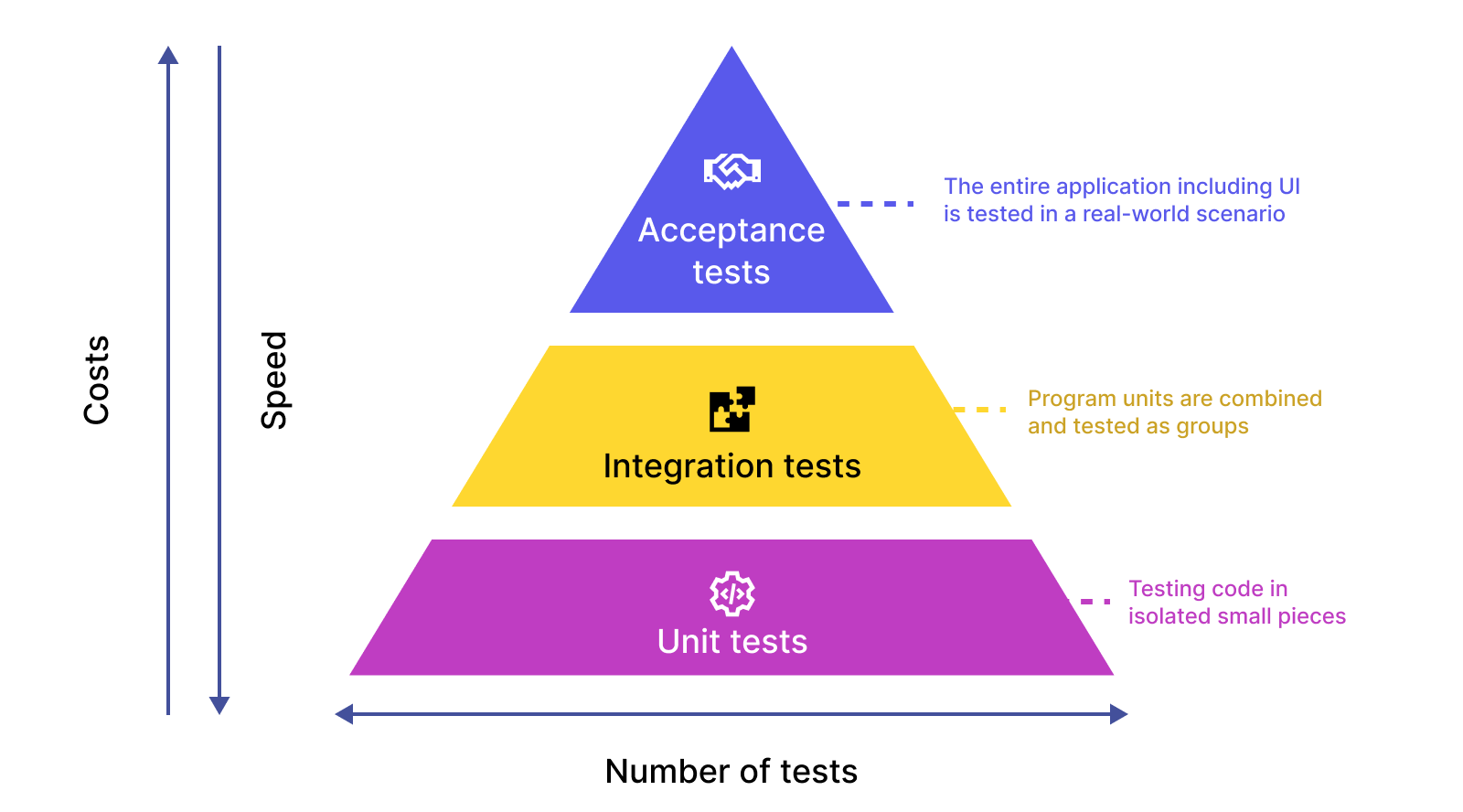Table of Contents
Tests unitarios y de integración

Tests unitarios
Utils
Además de las capas Service y Controller, vamos a suponer también que tenemos algunos métodos de utilidad, por ejemplo para trabajar con fechas. Asi también veremos cómo preparar los test unitarios para esta parte del código.
public class DateUtil { public static final String DATE_PATTERN = "dd/MM/yyyy"; public static LocalDate format(String date) { return LocalDate.parse(date, DateTimeFormatter.ofPattern(DATE_PATTERN)); } public static long getDaysBetweenDates(LocalDate startDate, LocalDate endDate) { return Math.abs(startDate.until(endDate, ChronoUnit.DAYS)); } }
Asi, para las dos funciones anteriores, podríamos preparar algunos casos que nos permitieran comprobar cómo funciona para diferentes entradas.
public class DateUtilTests { @Test public void testFormat() { String dateString = "12/04/2025"; LocalDate actualLocalDate = DateUtil.format(dateString); assertEquals(2025, actualLocalDate.getYear()); assertEquals(4, actualLocalDate.getMonthValue()); assertEquals(12, actualLocalDate.getDayOfMonth()); } @Test public void testGetDaysBetweenDates() { LocalDate startDate = LocalDate.of(2025, 1, 1); LocalDate endDate = LocalDate.of(2025, 3, 1); long actualDays = DateUtil.getDaysBetweenDates(startDate, endDate); assertEquals(59, actualDays); actualDays = DateUtil.getDaysBetweenDates(endDate, startDate); assertEquals(59, actualDays); actualDays = DateUtil.getDaysBetweenDates(startDate, startDate); assertEquals(0, actualDays); } }
Capa Service
@Service public class CarService { . . . public List<CarOutDto> getAll(String brand, String model) { List<Car> carList; if (brand.isEmpty() && model.isEmpty()) { carList = carRepository.findAll(); } else if (brand.isEmpty()) { carList = carRepository.findByModel(model); } else if (model.isEmpty()) { carList = carRepository.findByBrand(brand); } else { carList = carRepository.findByBrandAndModel(brand, model); } return modelMapper.map(carList, new TypeToken<List<CarOutDto>>() {}.getType()); } . . . }
En este caso tenemos el método getAll que toma 2 parámetros para filtrar el listado de vehículos por brand y/o model, por lo que deberíamos preparar varios casos, uno por cada posibilidad. Sería algo como lo siguiente:
getAll(“”, “”)getAll(brand, “”)getAll(“”, model)getAll(brand, model)
Para lo que necesitemos de la capa Repository, usaremos un objeto Mock para el que prepararemos nosotros mismos las respuestas según el caso. Algo parecido haremos también para el Bean de ModelMapper
@ExtendWith(MockitoExtension.class) public class CarServiceTests { @InjectMocks private CarService carService; @Mock private CarRepository carRepository; @Mock private ModelMapper modelMapper; @Mock private UserRepository userRepository; @Test public void testGetAll() { List<Car> mockCarList = List.of( new Car(1, "Opel", "Corsa", LocalDate.now(), LocalDate.now(), 200, 0.5, 0.34, null), new Car(2, "Ford", "Fiesta", LocalDate.now(), LocalDate.now(), 120, 0.5, 0.34, null), new Car(3, "Ford", "Ka", LocalDate.now(), LocalDate.now(), 100 , 0.2, 0.56, null) ); List<CarOutDto> mockCarOutDtoList = List.of( new CarOutDto(1, "Opel", "Corsa", 1, 0.5, 0.34), new CarOutDto(2, "Ford", "Fiesta", 1, 0.5, 0.34), new CarOutDto(3, "Ford", "Ka", 2, 0.2, 0.56) ); // Mocks when(carRepository.findAll()).thenReturn(mockCarList); when(modelMapper.map(mockCarList, new TypeToken<List<CarOutDto>>() {}.getType())).thenReturn(mockCarOutDtoList); // Listado de coches sin aplicar ningún filtro List<CarOutDto> carList = carService.getAll("", ""); assertEquals(3, carList.size()); assertEquals("Opel", carList.get(0).getBrand()); assertEquals("Corsa", carList.get(0).getModel()); assertEquals("Ford", carList.get(carList.size() - 1).getBrand()); assertEquals("Ka", carList.get(carList.size() - 1).getModel()); verify(carRepository, times(1)).findAll(); verify(carRepository, times(0)).findByBrand(""); verify(carRepository, times(0)).findByModel(""); verify(carRepository, times(0)).findByBrandAndModel("", ""); } @Test public void testGetAllByBrand() { List<Car> mockCarList = List.of( new Car(1, "Opel", "Corsa", LocalDate.now(), LocalDate.now(), 200, 0.5, 0.34, null) ); List<CarOutDto> mockCarOutDtoList = List.of( new CarOutDto(1, "Opel", "Corsa", 1, 0.5, 0.34) ); // Mocks when(carRepository.findByBrand("Opel")).thenReturn(mockCarList); when(modelMapper.map(mockCarList, new TypeToken<List<CarOutDto>>() {}.getType())).thenReturn(mockCarOutDtoList); // Listado de coches aplicando el filtro por brand List<CarOutDto> carList = carService.getAll("Opel", ""); assertEquals(1, carList.size()); assertEquals("Opel", carList.get(0).getBrand()); assertEquals("Corsa", carList.get(0).getModel()); verify(carRepository, times(0)).findAll(); verify(carRepository, times(0)).findByModel("Opel"); verify(carRepository, times(0)).findByBrandAndModel("Opel", ""); verify(carRepository, times(1)).findByBrand("Opel"); } // TODO testGetAllByModel // TODO testGetAllByBrandAndModel> . . .
Capa Controller
@GetMapping("/cars") public ResponseEntity<List<CarOutDto>> getAll(@RequestParam(value = "brand", defaultValue = "") String brand, @RequestParam(value = "model", defaultValue = "") String model) { logger.info("BEGIN getAll"); List<CarOutDto> cars = carService.getAll(brand, model); logger.info("END getAll"); return new ResponseEntity<>(cars, HttpStatus.OK); }
@WebMvcTest(CarController.class) public class CarControllerTests { @Autowired private MockMvc mockMvc; @Autowired private ObjectMapper objectMapper; @MockBean private CarService carService; @MockBean private UserRepository userRepository; @Test public void testGetAllWithoutParametersReturnOk() throws Exception { List<CarOutDto> mockCarOutDtoList = List.of( new CarOutDto(1, "Opel", "Corsa", 1, 0.5, 0.34), new CarOutDto(2, "Ford", "Fiesta", 1, 0.5, 0.34), new CarOutDto(3, "Ford", "Ka", 2, 0.2, 0.56) ); when(carService.getAll("", "")).thenReturn(mockCarOutDtoList); MvcResult response = mockMvc.perform(MockMvcRequestBuilders.get("/cars") .accept(MediaType.APPLICATION_JSON_VALUE)) .andExpect(status().isOk()) .andReturn(); String jsonResponse = response.getResponse().getContentAsString(); List<CarOutDto> carListResponse = objectMapper.readValue(jsonResponse, new TypeReference<>(){}); assertNotNull(carListResponse); assertEquals(3, carListResponse.size()); assertEquals("Opel", carListResponse.get(0).getBrand()); assertEquals("Corsa", carListResponse.get(0).getModel()); } @Test public void testGetAllByBrandReturnOk() throws Exception { List<CarOutDto> mockCarOutDtoList = List.of( new CarOutDto(1, "Opel", "Corsa", 1, 0.5, 0.34), new CarOutDto(2, "Opel", "Astra", 1, 0.5, 0.34) ); when(carService.getAll("Opel", "")).thenReturn(mockCarOutDtoList); MvcResult response = mockMvc.perform(MockMvcRequestBuilders.get("/cars") .queryParam("brand", "Opel") .accept(MediaType.APPLICATION_JSON_VALUE)) .andExpect(status().isOk()) .andReturn(); String jsonResponse = response.getResponse().getContentAsString(); List<CarOutDto> carListResponse = objectMapper.readValue(jsonResponse, new TypeReference<>(){}); assertNotNull(carListResponse); assertEquals(2, carListResponse.size()); assertEquals("Opel", carListResponse.get(0).getBrand()); assertEquals("Corsa", carListResponse.get(0).getModel()); } // TODO testGetAllByModelReturnOk // TODO testGetAllByBrandAndModelReturnOk . . .
Tests de integración
© 2025 Santiago Faci
